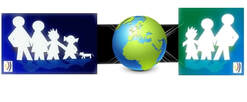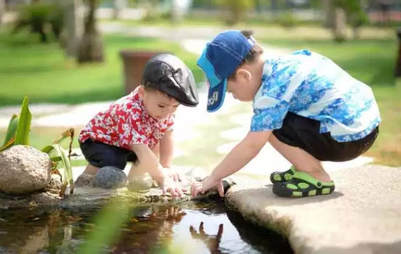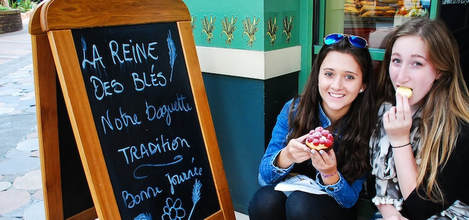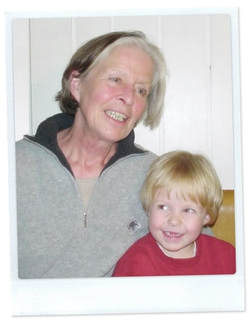We speak the same language.In many languages.
Language is the key to other people, to the world and its wisdom, to mutual understanding.
Language drives science, entertainment and business, brings cultures together and makes life richer. Languages - now we're talking plural! - multiply these benefits and open up new worlds. We know that, sure. But do our children understand it too? Here's how we convince them. If you want kids to learn a language, give them someone they love to talk with.Yesssss, we mean: foreigners! Cool, friendly, curious kids from other countries.
That's how we establish language partnerships for children of all age groups. Once they long to understand and to be understood, they're on their way.
What seemed like a hell of a challenge becomes part of everyday life.
From spending holidays with each other to gaming and counter-checking homework online all the way to working out school projects in cooperation - it works! |
September 26 |
|
How to start
|
First, you find suitable partners. Let's assume you live in Germany. Most likely, your first partner family will be English native speakers. Later you might partner with a second family speaking Spanish, French or perhaps Italian. On the third language level teenagers often seek their own partners, many opt for Japanese or Russian, the demand for Mandarin is growing fast too ...
See here on how you need not even leave the country for it! Your ideal match is based on what you are looking for and what you can offer. Essential parameters include the children's age groups, language preferences and personal interests of both (!) generations. Very popular combinations are: rural/urban and seaside/mountains. Most partnerships turn into lasting friendships. |
|
Familiarity
|
Knowing you can trust each other and feeling comfortable in each other's company
helps to focus on learning and understanding. Sincerity and reliability are essential. Once everyone's at ease and familiarity sets in, "you're at home". |
|
Famillage
Holidays |
Together, you rethink your concept of planning holidays.
Quite likely for good! Famillage Holidays is the combination of language holidays and holiday child care. more here! |
Here's a classic chronology.
|
|
0 - 4 yrs
|
You are a toddler. Your family and your partner family go on holidays together!
Perhaps at their place, next time at your place or another destination you both fancy. Your first steps to get to know the language: Meet the other kids. Play with them. You realize: "I want to know what they're saying!" Now you're getting familiar with their sounds and step by step you pick up some words. At bedtime, you'll be asking mum about them. |
|
4 - 10 yrs
|
In school and/or at home, you learn the basics. Some words, a bit of grammar ...
Your parents plan family holidays together with your partners. By now, you're talking quite a lot too, you start to understand more and more. Of course, there will be mutual visits. And throughout the year, there are plenty of opportunities to chat online. |
|
10 - 14 yrs
|
Holidays abroad with your language friends again, this time they are considerably longer.
Your folks may take you there, but there's no need for them to hang around. They can do their own thing. You and your pals are busy anyway! You do sports, watch TV, play and talk, go to see their school and meet their friends. And you will do the same when they come to visit you: Your family - just like theirs - will go for trips with you and your mates, will show them around and give them a good idea of local culture and lifestyle. Perhaps you'll spend most of your summer this way. And you are going to have a good time! Languages are a really important part of school life by now, and you cooperate with your partner, you counter-check homework, ask questions, swap books, work on school projects together. Many kids actively involve their class and their teacher, so it is win-win-win and more fun. |
|
15 - 17 yrs
|
Time for real language holidays. Now you can go all by yourself. You know your way around!
Well, at least most of the time anyway ... You've had ample time to plan, so you're going to make good use of your stay there. Maybe you'll go on a hiking tour together, learn how to do something new, even help with work around the house. And you will make a point to read at least one good book a week and ask questions every time you need to. When your mates repay the visit, they'll do the same thing. How about spending a whole year at your partner's school? In exchange! Shared Mindspace tells you how it works. |
|
18 +
|
Time to get serious about university, gap year, internships.
By now you have good friends abroad in one, two or more places. You speak a few languages quite well - certainly much better than your peers at home - and you are keen to make good use of your contacts and your skills. Places to stay, to study and to work are waiting for you wherever you want. By now you will also have realized that your community has no age limit and no expiry date. It can be yours for life. |
The third
|
Kids' and grandparents' interests can be tallied in so many ways. Taking or picking up a grandchild is a tremendous help to start with. This way the parents don't have to take time off work.
And most grandparents love to meet the host family and to see where and how they live. Often they continue to a holiday destination to suit their own interests. What's more, there's always the option of becoming a "Granny AuPair" for a while! Everyone benefits from the mutuality principle: To be host and guest alternatively the kids have double time with each other and yet, they only require half the holiday child care, if any at all. |
The language. And the life. |
|
Some basics
|
For Global Natives, international exchange is not a service to be purchased.
We're not an agency; this is your way of taking things into your own hands. You are in charge. The Global Natives community exists because there is a great demand for globalization on a personal level. There is no way around globalization per se, but if we leave it to governments and multinationals, we need not expect a good future for our children. We're expanding our strong network of families, currently active in over 60 countries, who share our values and beliefs and the mutual goal of raising a competent new generation of global citizens. For this end, we share what we know, and we begin with our languages. |
|
Some links
|
To fully understand the spirit of this community, we invite you to browse through the entire website.
This will introduce you to aspects of international connectivity you maybe never considered before. It is worth your time. However, here are a few shortcuts to the most relevant pages for language learners:
|
|
The cost?
How much? |
You pay the annual membership fee. (more details here)
And there are of course all personal expenses: Travel, accommodation, pocket money etc. But that's it. |










